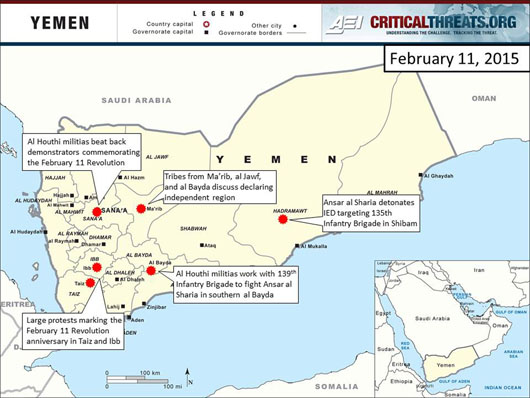The U.S. closed its embassy in Sana’a and relocated American embassy staff out of Yemen due to security concerns over the threat from al Qaeda in the Arabian Peninsula (AQAP) and growing civil unrest. Southern and east-central regional factions continue to take steps toward complete autonomy from Yemen’s central government as large anti-al Houthi demonstrations occur in Yemen’s central region.
U.S. Embassy Sana’a closed. The U.S. State Department suspended embassy operations and relocated embassy staff from Sana’a. U.S. Embassy Sana’a issued a travel warning calling for all Americans in Yemen to leave. Pentagon spokesman Rear Admiral John Kirby asserted that the U.S. has special operations forces in country and is still providing Yemeni security forces with counter-terrorism training. The British and French embassies also closed.
The al Houthis continue to control the Yemeni government as UN-brokered negotiations falter. The UN Special Envoy to Yemen Jamal Benomar continued talks with the al Houthis and Yemen’s main political parties on February 10, but it does not appear the al Houthis will backtrack on any of their demands or plans to form a new government. Al Houthi leader Abdul Malik al Houthi gave a televised address on February 10 warning all parties and foreign actors to work in the interests of the Yemeni people.
The al Houthis are working alongside the Yemeni military in al Bayda. Al Houthi militants and Yemeni military forces seized the Dhi Na’im Mountains in southern al Bayda from AQAP’s insurgent arm Ansar al Sharia on February 9. Al Houthi militias entered the city of al Bayda near the Abyan-al Bayda border on February 10 and deployed fighters alongside Yemeni military forces throughout the city. The al Houthis are reportedly working with the 139th Infantry Brigade. An AQAP source stated that AQAP militants are working with tribesmen in al Bayda to combat the al Houthis. Tribesmen in Lahij and Shabwah deployed fighters to their borders and closed roads in response to al Houthi advances in al Bayda.
Tribes in Ma’rib, al Bayda, and al Jawf, are considering plans to declare an independent region in central Yemen. Tribesmen from Ma’rib, al Jawf, and al Bayda gathered on February 9 to discuss the creation of an autonomous region in the historical territory of Sheba in central Yemen. Tribesmen also asserted that they will halt oil flow to Sana’a. A declaration of independence from tribes in the region will likely drive al Houthi militants to enter Ma’rib.
Large anti-al Houthi protests occurred in major cities on the anniversary of the February 11 Revolution. Demonstrators took to the streets in Sana’a, Taiz, and Ibb on February 11, the fourth anniversary of Yemen’s Arab Spring protests. Al Houthi local militias assaulted protesters in Sana’a and attempted to close roads to prevent the spread of protests.
A push by tribes in central Yemen may embolden southern governorates to declare independence. Continued al Houthi expansion south to al Bayda will likely drive tribal support to AQAP and give militants more operating room in southern Yemen. The closure of the U.S. embassy will likely affect counter-terrorism cooperation with the Yemeni military.
← PREVIOUS |
NEXT → |

